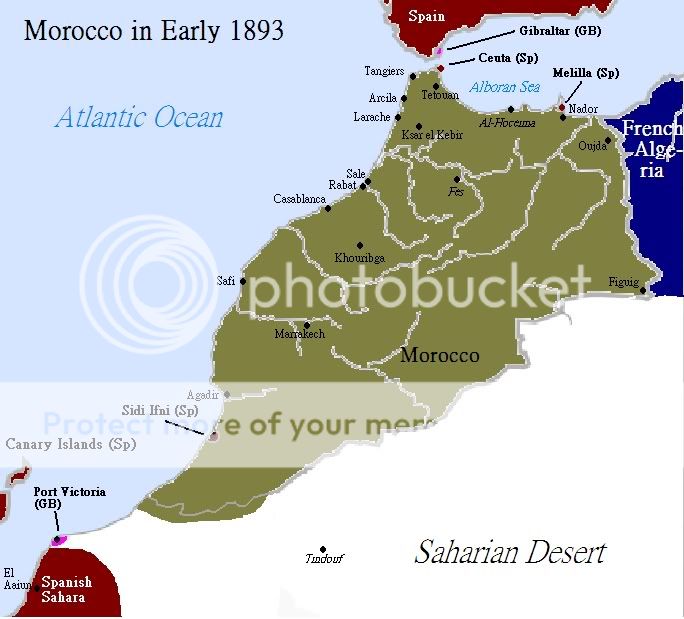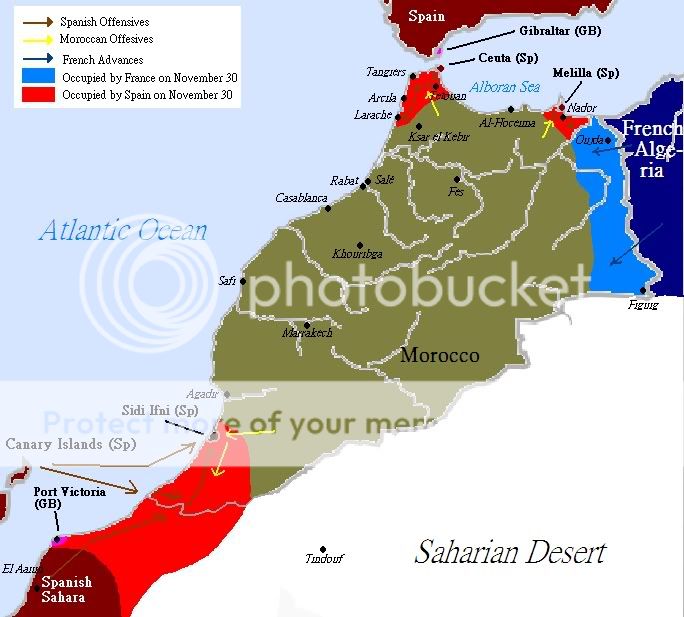To the Straits and Beyond: The Spanish-Moroccan War of 1893
Now that Sagasta was on the Government, he had some uneasy challenges to solve. One was to secure his own position on the presidential seat and the other was to calm the tense situation in the country (which he had helped to create in the previous years, of course). Surprisingly, the Goddess Fortune gave him the solution to both tasks in just a matter of months.
Just some weeks after the elections, a Spanish merchant ship was captured by Riffian tribesmen while she was travelling from Melilla to Ceuta. The following investigation concluded that the entire crew had been either killed or sold into slavery. Simply perfect. And not so much later, when the indignation about the incident was spreading through Spain and (thanks to the Spanish businessmen and diplomats) many other countries, 6000 Riffians armed with Remington riffles attacked the defensive outposts around Melilla. In truth, this was just another of the many attacks that the Riffians launched on the Spaniards during the 19th Century, but this time the attack was a splendid tool in the hands of the Spanish Government. To make things even easier, that same year of 1893 ended the Mediterranean Trust that guaranteed the status quo in North Africa, and the European public opinion was too much centred on the heroic stance of the Melilla garrison and the suffering of the civilian population in the city to propose a renewal of the agreement.
Sagasta demanded an immediate response from the Sultan Hassan I, but it was just hot air. At the same time the Spanish ambassador was meeting with the Sultan in Fez, the outraged people and the press were claiming for war against the old Muslim enemy, the Spanish Army and Navy were carrying the biggest mobilization in years, the war plans were heavily debated and drawn in the Ministry of War and the ambassadors were making a noisy campaign in favour of Spain in the other European capitals and most notably in London, who had been always the more sceptical towards a Spanish expansion in both sides of the Straits.
The Sultan recognized Spain as the attacked part, but didn’t take any action to stop the Riffians as he had no real control over them. The Spanish government claimed that the Moroccans were behind the attack and that the refusal was the confirmation of the Sultan’s implication. The ambassador was recalled and Spain declared war on Morocco in October 5, 1893. General José López Domínguez, head of the Unionists and Vice-President in Sagasta’s coalition government, was appointed as commander in chief of the operation (probably, by decision of Sagasta himself, to have him far from the political centre at Madrid and to blame him if things went wrong). The recruitment wasn’t a problem, as many Spaniards presented voluntarily in the recruitment centres through the country and as far as Cuba and Puerto Rico.
TL of the Spanish-Moroccan War
October 5 – Spain declares war on Morocco and completes de order of general mobilization. Moroccan authorities call all men able in the kingdom to serve in the army. The siege of Melilla becomes a bloodbath as more and more Riffians (encouraged by the marabunts, who declare jihad on Spain) come to attack the city, but the defensive force resists.
October 6 – The Spanish fleet directed by Admiral Pascual Cervera imposes an effective blockade of the Moroccan coast. Several ports and coastal towns will be shelled in the following days.
October 10 – A column directed by Gen. Martínez-Campos leaves ceuta.
October 13 – Limited battle between Spanish and Moroccan forces at Zeïtoun, resulting in Spanish victory.
October 15 – The Riffian siege of Melilla is dismantled. The Riffian strategy of throwing human waves towards the Spanish walls and forts has become a bloodbath due to the action of the Spanish Mausers and machine guns. The searchlight becomes another useful tool as the Spanish ships use it to locate and fire on the Riffian positions during the night.
October 19 – Martínez-Campos takes Dar Guarda and, after receiving reinforcements, plans the attack on Tetouan.
October 20 – Battle of El Malaliyine: A great Moroccan offensive intended to expel the Spanish from Dar Guarda is defeated, becoming the first big engagement of the war. The Moroccan forces flee to Tetouan.
October 23 – Spanish sorties around Melilla prove to be difficult due to the strike-and-flee strategy used by Riffian guerrillas.
October 27 – Like in the war of 1860, Tetouan falls to the Spanish with the inestimable help of the local Sephardic population, who receives the conquerors cheering in their own language -
¡Bienvenidos hermanos! ¡Viva el rey de España!
October 30 – Moroccan forces leaded by the Sahrawi Sheikh Ma al-‘Anyan attack the Spanish positions at Ifni. The defenders leave some outer outposts and retreat to the inner line of defense, though the supply line is secured due to the proximity of the Canary Islands.
November 1 – Spanish forces enter Nador after hard fights with the Riffian berbers.
November 6 – Battle of Darfaoua: Martínez-Campos defeats another Moroccan attempt to break the Spanish lines in the Northern Rif. Tangiers is effectively isolated from the rest of Morocco, by land or sea.
November 7 – Martínez-Campos sends a letter to the governor of Tangiers encouraging him to surrender. He refuses the offer. The city is shelled again by Cervera’s fleet and the forces deployed outside the city prepare to lay the proper siege.
November 12 – Battle of the River Draa: Marching from El Aaiun, Spanish soldiers helped by Saharawi mercenary cavalry inflict a severe defeat to the surprised Moroccan forces in the region. After receiving the news about this, Ma al-‘Anyan remembers to his troops that this is a jihad and that every Muslim cooperating with the invaders is an apostate and must be executed. The siege of Ifni is intensified.
November 15 – Riots break out in Tangiers between the local Muslim and Jewish populations.
November 18 – Tangiers falls to the Spanish, welcomed again by the Sephardic population. Foreign journalists covering the event popularize the expression “to have a Jewish Agent” to describe the action of people behind the war front who undermine the government they are supposed to be loyal. The expression becomes even more famous when the following year the Jewish Captain Alfred Dreyfus is arrested in France accused of passing secret information to the Germans.
November 20 – Gen. Joaquín Vara del Rey decisively defeats Ma al’Anyan's forces at the Battle of Ougrane, in which the Sheikh himself is killed in action. The next day the siege of Ifni is totally lifted and the city firmly connected with the Spanish possessions in the Western Sahara.
November 24 – Freed by the fall of Tangiers, Martínez-Campos accelerates the march and occupies Arcila and Larache.
November 30 – Spanish forces from Melilla reach the Muluya River, only to discover that there is a French camp on the opposite bank. Not so much later the Spanish Government receives confirmation that French troops deployed in Algeria had occupied Oujda, Berkane and probably also Figuig and Bou Arfa in the previous weeks, leading to the n-th crisis between the Spanish and French governments. While the respective governments denounce the other’s actions and try to attract the support of the rest of European powers, the French and Spanish troops confronted at the Muluya engaged in a rather bizarre type of ‘discussion’, as a British war correspondent noted:
That was the most terrible battle I saw during my stance in Morocco. No bullet was fired, and nobody was killed. Yet the image was so offensive to an educated person that it was difficult to see. There, on one bank, there were the French shouting “merdegnols
” and “demi maures
”; on the other, the Spaniards responding “maricones
” and “gabachos de mierda
”. I went to Colonel Antero Rubín thinking he would finish that indiscipline, but when I found him he was just seated on his wing-chair smiling and pulling his beard, apparently enjoying the situation. His reaction didn’t change when some young recruits started to show their nude backsides to the French. From my position I could see the French commander, and he was doing exactly the same that Rubín: nothing.
To be continued


